The Intel Xeon W Review: W-2195, W-2155, W-2123, W-2104 and W-2102 Tested
by Ian Cutress & Joe Shields on July 30, 2018 1:00 PM EST- Posted in
- CPUs
- Intel
- Xeon
- Workstation
- ECC
- Skylake-SP
- Skylake-X
- Xeon-W
- Xeon Scalable
Benchmarking Performance: CPU Encoding Tests
One of the interesting elements on modern processors is encoding performance. This includes encryption/decryption, as well as video transcoding from one video format to another. In the encrypt/decrypt scenario, this remains pertinent to on-the-fly encryption of sensitive data - a process by which more modern devices are leaning to for software security. Video transcoding as a tool to adjust the quality, file size and resolution of a video file has boomed in recent years, such as providing the optimum video for devices before consumption, or for game streamers who are wanting to upload the output from their video camera in real-time. As we move into live 3D video, this task will only get more strenuous, and it turns out that the performance of certain algorithms is a function of the input/output of the content.
All of our benchmark results can also be found in our benchmark engine, Bench.
7-Zip 9.2
One of the freeware compression tools that offers good scaling performance between processors is 7-Zip. It runs under an open-source licence, is fast, and easy to use tool for power users. We run the benchmark mode via the command line for four loops and take the output score.
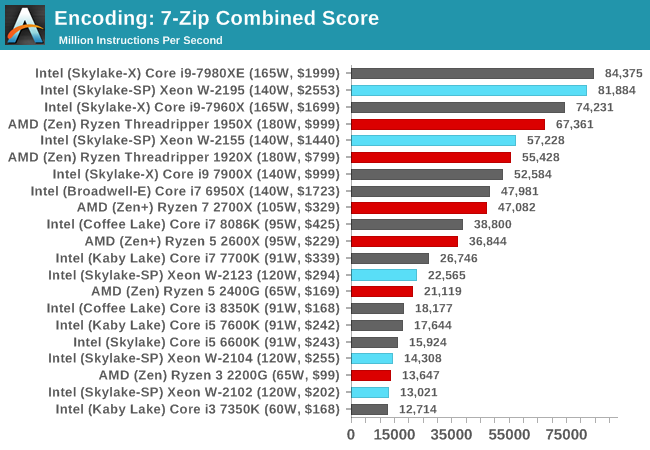
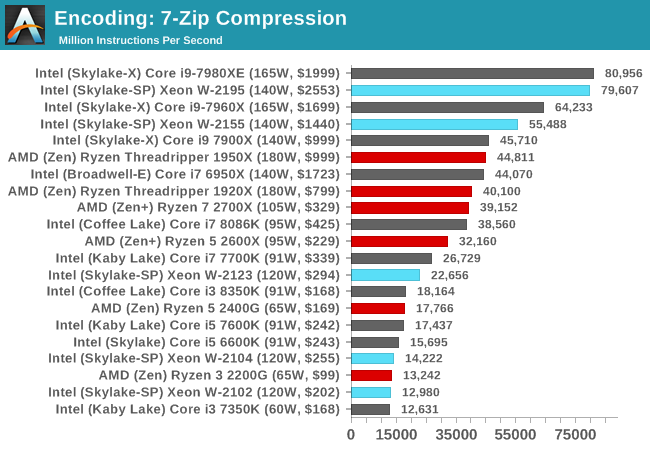
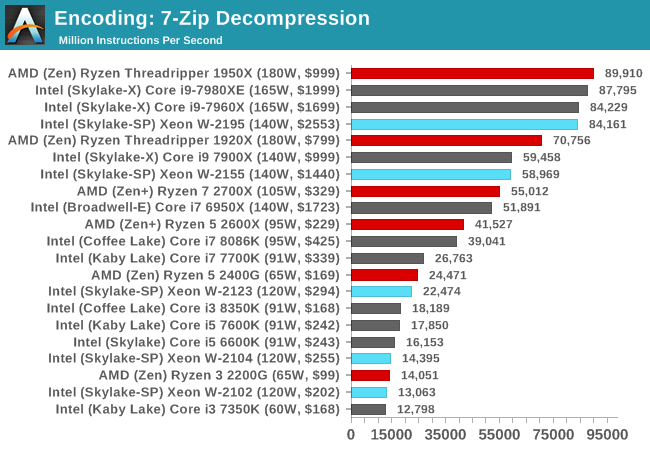
AMD's prowess in decompression means that it takes the top spot, however overall the W-2195 and the i9-7980XE are competing for top spot.
WinRAR 5.40
For the 2017 test suite, we move to the latest version of WinRAR in our compression test. WinRAR in some quarters is more user friendly that 7-Zip, hence its inclusion. Rather than use a benchmark mode as we did with 7-Zip, here we take a set of files representative of a generic stack (33 video files in 1.37 GB, 2834 smaller website files in 370 folders in 150 MB) of compressible and incompressible formats. The results shown are the time taken to encode the file. Due to DRAM caching, we run the test 10 times and take the average of the last five runs when the benchmark is in a steady state.
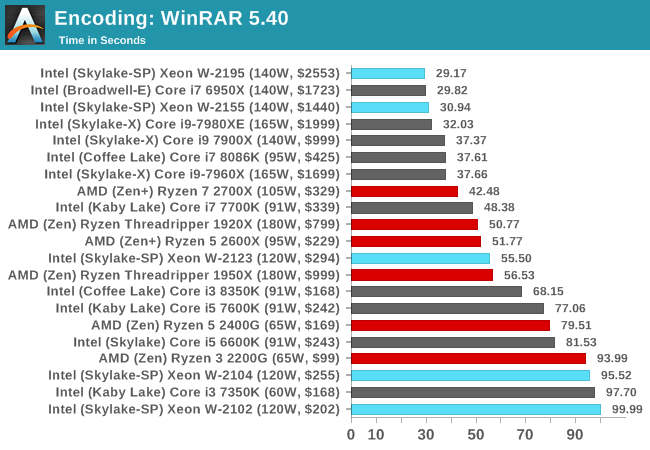
WinRAR likes cores and memory, and it seems that even the W-2155 can win against the Core i9-7980XE in this test. Despite the quad channel memory for the Xeon W quad core parts, the low frequency means they are bringing up the rear. The W-2123 hits mid-pack, actually beating the Threadripper 1950X in this test.
AES Encoding
Algorithms using AES coding have spread far and wide as a ubiquitous tool for encryption. Again, this is another CPU limited test, and modern CPUs have special AES pathways to accelerate their performance. We often see scaling in both frequency and cores with this benchmark. We use the latest version of TrueCrypt and run its benchmark mode over 1GB of in-DRAM data. Results shown are the GB/s average of encryption and decryption.
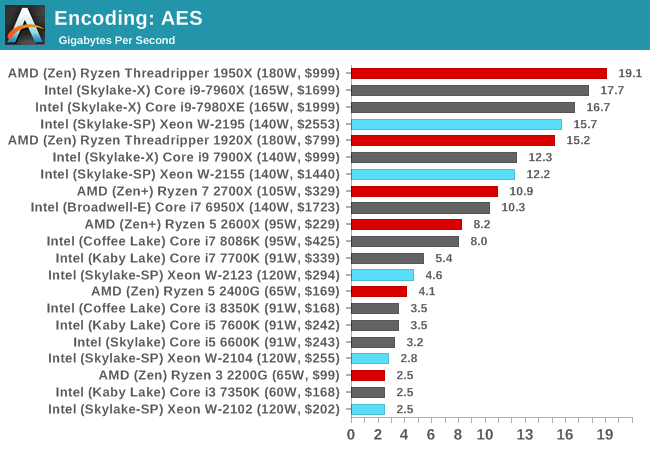
HandBrake v1.0.2 H264 and HEVC: link
As mentioned above, video transcoding (both encode and decode) is a hot topic in performance metrics as more and more content is being created. First consideration is the standard in which the video is encoded, which can be lossless or lossy, trade performance for file-size, trade quality for file-size, or all of the above can increase encoding rates to help accelerate decoding rates. Alongside Google's favorite codec, VP9, there are two others that are taking hold: H264, the older codec, is practically everywhere and is designed to be optimized for 1080p video, and HEVC (or H265) that is aimed to provide the same quality as H264 but at a lower file-size (or better quality for the same size). HEVC is important as 4K is streamed over the air, meaning less bits need to be transferred for the same quality content.
Handbrake is a favored tool for transcoding, and so our test regime takes care of three areas.
Low Quality/Resolution H264: Here we transcode a 640x266 H264 rip of a 2 hour film, and change the encoding from Main profile to High profile, using the very-fast preset.
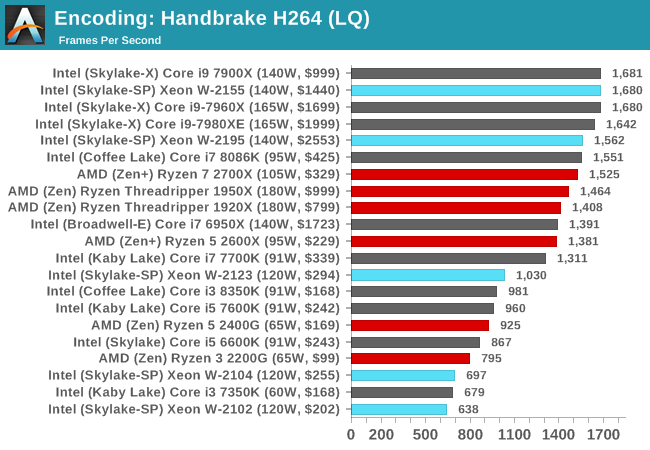
High Quality/Resolution H264: A similar test, but this time we take a ten-minute double 4K (3840x4320) file running at 60 Hz and transcode from Main to High, using the very-fast preset.
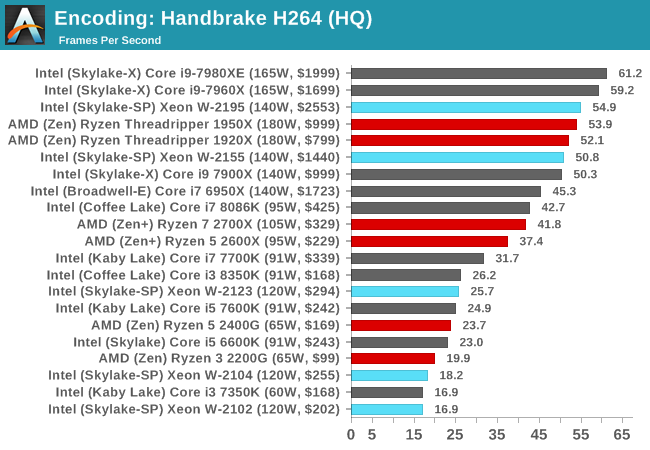
HEVC Test: Using the same video in HQ, we change the resolution and codec of the original video from 4K60 in H264 into 4K60 HEVC.
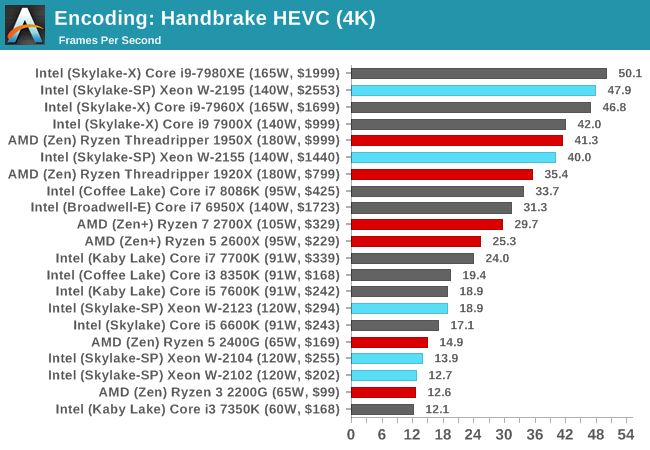










74 Comments
View All Comments
0ldman79 - Tuesday, July 31, 2018 - link
Agreed.I imagine there will be several situations where the 6 core 12 thread i7 will outperform the i9 9700.
If the cache increase is enough that may not happen, but I'm not betting on it making up enough of a difference.
Icehawk - Friday, August 3, 2018 - link
The 8086 is functionally equivalent to the 8700, they trade blows in a pretty tight grouping so I don’t mind that they used it’s scores.mode_13h - Monday, July 30, 2018 - link
Their pricing is nuts! These can only make sense if you're desperate for PCIe lanes or lots of cores (and, for some reason, don't want AMD).I have an older E5 Xeon and wanted to replace it with a W-series, but I can't justify this pricing (or the performance hit taken on the lower-core-count models, relative to desktop/E-series chips). I will have to opt for either an E-series Xeon or a Ryzen. At this rate, I see myself going for a 7 nm Ryzen, actually.
I think AMD is smart for using narrow AVX units. > 256-bit doesn't really make sense for much that wouldn't be better-served by a GPU. AVX-512 was a strategic misstep for Intel, and they're just going to have to live with it.
mode_13h - Monday, July 30, 2018 - link
Oh, and let's not forget the IHS TIM issue.I'm not in the market for > 8 cores, but those who are will be disappointed by the rate of thermal throttling, due to this being their first (recent) workstation/HEDT chip with a non-soldered IHS.
0ldman79 - Tuesday, July 31, 2018 - link
I missed that.The IHS is using TIM even on the Xeon now?
That was honestly the one big reason I was looking at the Xeon. That's just a poor business decision. Xeon carries a price premium, they could at least guarantee the heat conductivity is going to be enough to keep it running cool and smoothly for the life of the chip.
mode_13h - Wednesday, August 1, 2018 - link
I don't know this for a fact, but their Xeons are normally just binned HEDT processors without the special features fused off. So, I assume it's the same crappy TIM under that IHS.Comparing thermal performance @ the same clock for 10+ core models vs the i9's would easily show whether this is true.
HStewart - Monday, July 30, 2018 - link
"I think AMD is smart for using narrow AVX units. > 256-bit doesn't really make sense for much that wouldn't be better-served by a GPU. AVX-512 was a strategic misstep for Intel, and they're just going to have to live with it."AMD's AVX 2 is only 1/2 of Intel AVX 2 - that sound like they are using dual 128 bits instead 256 bits
Also keep in mind Intel CPU also have AVX 2 support your statement makes no sense.
HStewart - Monday, July 30, 2018 - link
https://forums.anandtech.com/threads/ryzens-halved...bill.rookard - Monday, July 30, 2018 - link
The thing is - and this is somewhat critical for a workstation based board, you're NOT really going to be using it for single threaded tasks. You'll be using software which has for the most part SHOULD be multi-threaded. Considering that the Threadripper is a 16c/32t CPU in the gen1, and running for a street price of about $800ish, and the gen2 is going to be a 32c/64t beastie of a CPU at a price of $1500ish, why would you spend $2500 on a 18c/36t Intel CPU?You could just as easily do some research to find people who have indeed put together some TR/ECC combos, and put a complete AMD system for the price of an Intel CPU alone.
mode_13h - Tuesday, July 31, 2018 - link
That's nuts, dude. For software development, I want lotsa cores for parallel builds. When recompiling only a few files, I want fast single-thread perf.The reality is that there are still lots of places in day-to-day computing where single-thread perf matters. I don't know how you can possibly believe you accurately represent the needs of all workstation users, but you don't.